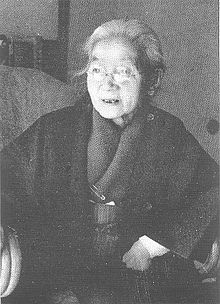Kokkō Sōma
| Kokkō Sōma | |
|---|---|

= Kokkō Sōma
|
|
| Born |
September 12, 1876 Sendai, Miyagi, Japan |
| Died | March 2, 1955 (aged 78) Tokyo, Japan |
| Nationality | Japanese |
| Occupation | businesswoman, philanthropist, entrepreneur, social activist |
Kokkō Sōma (相馬黒光 Sōma Kokkō, September 12, 1876 – March 2, 1955) was an entrepreneur, philanthropist, patron of artists and patron of Pan-Asian politics during the pre-war Empire of Japan. She was the wife of Aizō Sōma, the founder of Nakamura-ya, a noted bakery in Tokyo.
Sōma was born as Hoshi Ryō (星良), and was the samurai in the sercive of Sendai domain, and her mother was a scholar of Chinese classical literature. She came into contact with Christianity through missionaries at an early age, and was sent to the Ferris Girls' School in Yokohama, and later transferred to the Meiji Girls' School in Kojimachi, Tokyo, where she studied under Hoshino Tenchi, Kitamura Tokoku and Tōson Shimazaki. She was given the pen name of Kokko by one of her teachers, with the cautionary note that for women authors, only a moderately shining light would be considered acceptable by society. In 1898, she married Aizō Sōma, a follow Christian, and moved to what is now Azumino, Nagano, where her husband was combining social activism with sericulture.
However, she had frequent problems with her health and with adjusting to rural life, and the couple relocated to Tokyo in 1901. In Tokyo, Sōma purchased the Nakamura-ya bakery near the main gate to Tokyo Imperial University. In 1909, the shop relocated to Shinjuku. The bakery often hired foreigners or consulted with foreign residents in Japan for ideas on new products or new condiments to use, and the shop flourished, later added a café and restaurant.
...
Wikipedia
